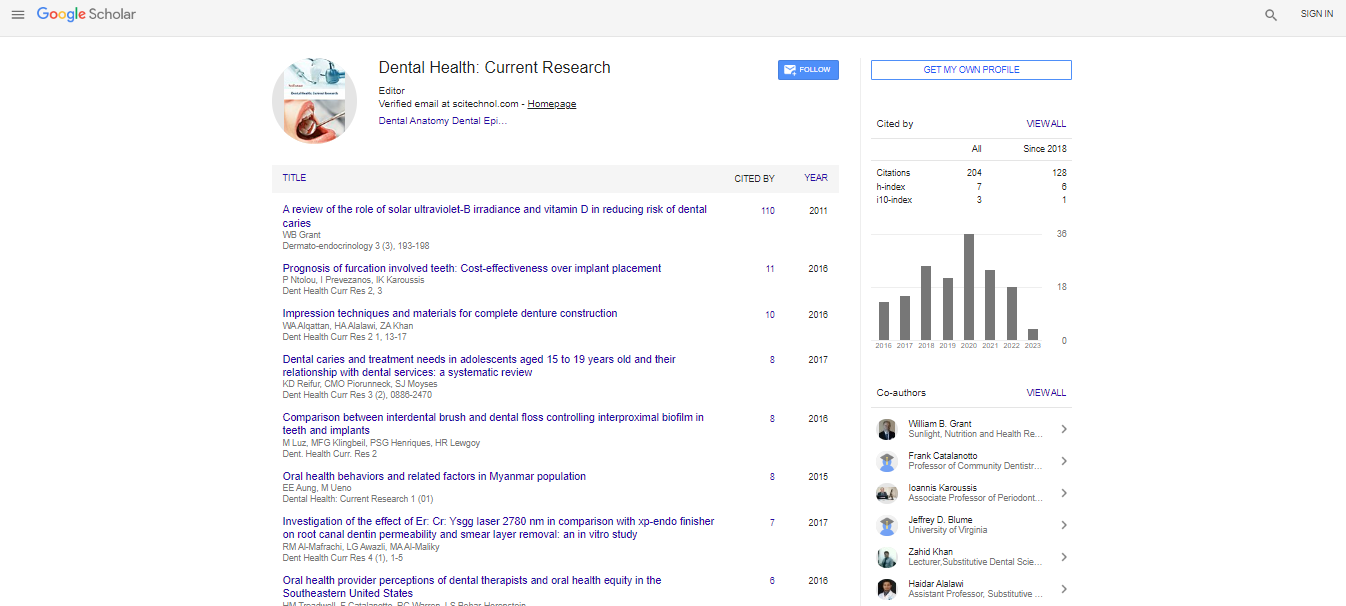Perspective, Dent Health Curr Res Vol: 10 Issue: 3
Enhancing Role of Fluoride in Dentistry: Combating Tooth Decay and Building Strong Enamel
Galviimain Hasnshim*
1Department of Restorative Dentistry, International Islamic University Malaysia, 25200, Pahang, Malaysia
*Corresponding Author: Galviimain Hasnshim,
Department of Restorative
Dentistry, International Islamic University Malaysia, 25200, Pahang, Malaysia
E-mail: galviimainha@gmail.com
Received date: 28 May, 2024, Manuscript No. DHCR-24-137161;
Editor assigned date: 30 May, 2024, Pre-QC No. DHCR-24-137161 (PQ);
Reviewed date: 14 June, 2024, QC No. DHCR-24-137161;
Revised date: 21 June, 2024, Manuscript No. DHCR-24-137161 (R);
Published date: 28 June, 2024, DOI: DOI: 10.4172/2470-0886.1000219
Citation: Hasnshim G (2024) Enhancing Role of Fluoride in Dentistry: Combating Tooth Decay and Building Strong Enamel. Dent Health Curr Res 10:3.
Description
Halitosis, commonly known as bad breath, is an issue that affects millions of people worldwide. It can be an embarrassing problem, often impacting personal and professional relationships. The origins of halitosis can be either oral or Gastrointestinal (GI), and understanding the root cause is essential for effective treatment. This article explores the various causes of halitosis and provides remedies to address bad breath from both oral and GI perspectives. The most common cause of halitosis is inadequate oral hygiene. When food particles are left in the mouth, they decay and produce unpleasant odors. Additionally, poor brushing and flossing habits can lead to plaque buildup and gum disease, both of which contribute to bad breath.
Saliva plays a important role in cleaning the mouth and neutralizing acids produced by bacteria. A dry mouth can result from certain medications, medical conditions, or simply not drinking enough water, leading to an increase in oral bacteria and bad breath. Certain foods like garlic, onions, and spicy dishes contain volatile compounds that can cause temporary bad breath. These compounds are absorbed into the bloodstream and expelled through the lungs, leading to noticeable odor. Tobacco use not only causes its own unpleasant smell but also contributes to dry mouth and gum disease, exacerbating halitosis. Gastroesophageal Reflux Disease (GERD) can cause stomach acids to flow back into the esophagus, leading to bad breath. The acid reflux can also cause a bitter taste in the mouth and exacerbate oral health issues. Conditions like Irritable Bowel Syndrome (IBS) and Small Intestinal Bacterial Overgrowth (SIBO) can contribute to halitosis. The imbalances in the digestive system can lead to the production of foul-smelling gases that are expelled through the breath. This type of bacterial infection in the stomach is associated with ulcers and can also cause bad breath due to the production of ammonia and other volatile compounds.
Brushing teeth at least twice a day with fluoride toothpaste, flossing daily, and using an antiseptic mouthwash can significantly reduce bad breath. Tongue scraping can also help remove bacteria and food particles from the surface of the tongue. Drinking plenty of water helps maintain saliva production, which is essential for washing away food particles and bacteria. Chewing sugar-free gum can also stimulate saliva flow. Routine visits to the dentist for professional cleanings and checkups can help identify and treat oral health issues that contribute to halitosis, such as gum disease or cavities. Quitting smoking and avoiding other tobacco products can drastically improve breath odor and overall oral health. Reducing the intake of foods known to cause bad breath, such as garlic and onions, can help. Incorporating more fresh fruits and vegetables can also promote better digestion and reduce halitosis.
For those with GERD, lifestyle changes such as eating smaller meals, avoiding food before bedtime, and elevating the head while sleeping can help reduce acid reflux. Medications like antacids or Proton Pump Inhibitors (PPIs) may also be prescribed by a healthcare professional. Addressing underlying digestive issues like IBS or SIBO through dietary changes, probiotics, or medications can help reduce halitosis. Consulting with a gastroenterologist is recommended for proper diagnosis and treatment. If H. pylori infection is diagnosed, a combination of antibiotics and acid-reducing medications is typically prescribed to eradicate the bacteria and improve symptoms, including bad breath.
Conclusion
Halitosis is a multifaceted condition that requires a comprehensive approach for effective management. By addressing both oral and gastrointestinal causes, individuals can significantly reduce or eliminate bad breath. Improved oral hygiene, dietary adjustments, proper hydration, and medical treatments for underlying conditions are key strategies. Regular dental checkups and consultations with healthcare professionals ensure that both the symptoms and root causes of halitosis are effectively addressed. With these measures in place, individuals can enjoy fresher breath and greater confidence in their daily interactions.
 Spanish
Spanish  Chinese
Chinese  Russian
Russian  German
German  French
French  Japanese
Japanese  Portuguese
Portuguese  Hindi
Hindi 